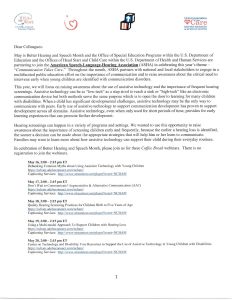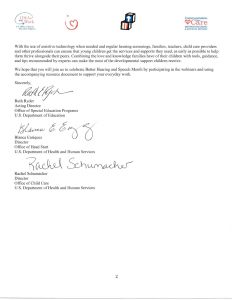Parenting a child with a hearing loss can be very similar, but also very different to parenting a hearing child.
Monthly Archives: May 2016
Better Hearing and Speech Month: Coffee Break Webinars
May is Better Hearing and Speech Month (BHSM) and the Office of Special Education Programs and the Offices of Head Start and Child Care are partnering to join the American Speech-Language-Hearing Association in celebrating this year’s theme – “Communication Takes Care.” Join the BHSM Coffee Break Webinar series, May 16-20, 2016 form 2:00 – 2:15 pm ET to learn more about hearing screening and the use of assistive technology to support young children with disabilities and their families. No registration is required to join the webinars.
May 16, 2:00 – 2:15 pm ET
Debunking Common Myths about Using Assistive Technology with Young Children
https://ncham.adobeconnect.com/ncham/
Captioning Services: http://www.streamtext.net/player?event=NCHAM
May 17, 2:00 – 2:15 pm ET
Don’t Wait to Communicate! Augmentative & Alternative Communication (AAC)
https://ncham.adobeconnect.com/ncham/
Captioning Services: http://www.streamtext.net/player?event=NCHAM
May 18, 2:00 – 2:15 pm ET
Quality Hearing Screening Practices for Children Birth to Five Years of Age
https://ncham.adobeconnect.com/ncham/
Captioning Services: http://www.streamtext.net/player?event=NCHAM
May 19, 2:00 – 2:15 pm ET
Using a Multi-modal Approach To Support Children with Hearing Loss
https://ncham.adobeconnect.com/ncham/
Captioning Services: http://www.streamtext.net/player?event=NCHAM
May 20, 2:00 – 2:15 pm ET
Center on Technology and Disability: Free Resources to Support the Use of Assistive Technology in Young Children with Disabilities
https://ncham.adobeconnect.com/ncham/
Captioning Services: http://www.streamtext.net/player?event=NCHAM
Catalyst Center organization changes name, launches new website
The name of the group that is home to the Catalyst Center has changed. The Catalyst Center, the national center dedicated to improving health care coverage and financing for children and youth with special health care needs, is now run by the Center for Advancing Health Policy and Practice (CAHPP, formerly the Health & Disability Working Group) at Boston University School of Public Health. The new name better reflects the group’s focus on advancing policies and practices that improve the well-being of vulnerable populations, including children with special health care needs. The Catalyst Center URL at http://catalystctr.org will continue to bring you to the Catalyst Center website, which is now part of the new CAHPP website at http://cahpp.org/project/the-catalyst-center/.
INTERVIEW WITH DR. LAURA MAULDIN: COCHLEAR IMPLANTS AND DEAF CHILDREN
Read about sociologist, Dr. Laura Mauldin’s, book, Made to Hear: Cochlear Implants and Raising Deaf Children.
Link: https://disabilityvisibilityproject.com/2016/05/01/interview-with-dr-laura-mauldin-cochlear-implants-and-deaf-children/
Do Hearing Aids Support Language Development in Children with Hearing Loss?
Over the last two decades, substantial resources have been dedicated toward the goals of early identification and intervention for children with hearing loss. Notable successes have occurred, including lowering the age of identification and the age of amplification from two years down to a few months of age (Holte. Am J Audiol 2012;21[2]:163-174). However, the evidence to suggest that the early provision of amplification has a positive impact on developmental outcomes in children with hearing loss has been more challenging to document.
Link: http://journals.lww.com/thehearingjournal/Fulltext/2016/05000/Do_Hearing_Aids_Support_Language_Development_in.3.aspx
Innovative noise reduction technology SEDA helps tackle babble signals from cochlear implants
Wearers of cochlear implants and hearing aids often have difficulty teasing out what someone is saying over “babble” — the cacophony of other talkers — and other ambient sounds. New York University researchers have devised a novel solution: an algorithmic approach that, like making drinkable water from pond water, distills the talker’s voice from a turbid wash of noise.
Link: http://www.news-medical.net/news/20160504/Innovative-noise-reduction-technology-SEDA-helps-tackle-babble-signals-from-cochlear-implants.aspx
The May Edition of “Probes and Tips” is Now Available
Communication Takes Care
Link: http://archive.constantcontact.com/fs154/1102782899287/archive/1124528155001.html
It’s Better Hearing & Speech Month!
During all of May, ASHA will be sharing resources and information on how to promote healthy communication habits! Check out this first in a series of videos that will show simple swaps that promote language development!

